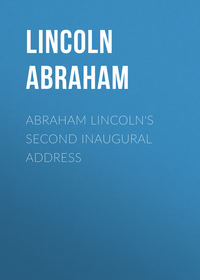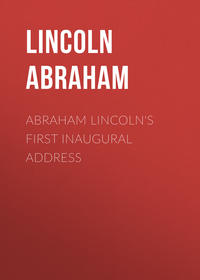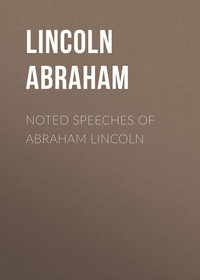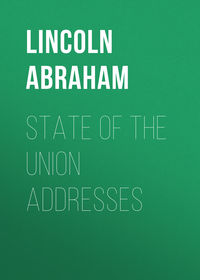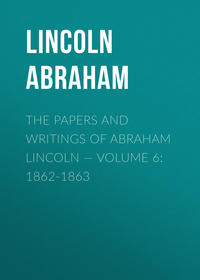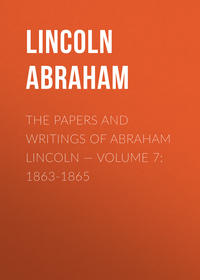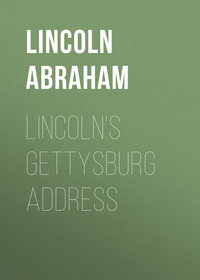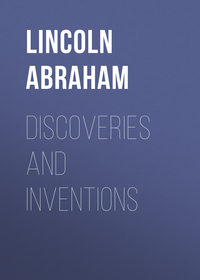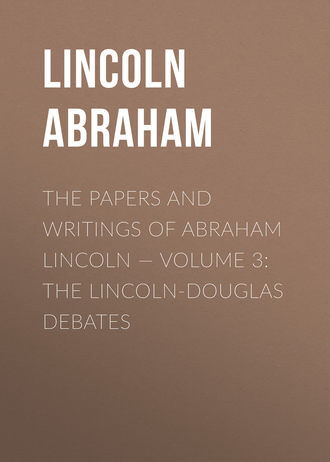 полная версия
полная версияThe Papers And Writings Of Abraham Lincoln — Volume 3: The Lincoln-Douglas Debates
Popular sovereignty! Everlasting popular sovereignty! Let us for a moment inquire into this vast matter of popular sovereignty. What is popular sovereignty? We recollect that at an early period in the history of this struggle there was another name for the same thing, — "squatter sovereignty." It was not exactly popular sovereignty, but squatter sovereignty. What do those terms mean? What do those terms mean when used now? And vast credit is taken by our friend the Judge in regard to his support of it, when he declares the last years of his life have been, and all the future years of his life shall be, devoted to this matter of popular sovereignty. What is it? Why, it is the sovereignty of the people! What was squatter sovereignty? I suppose, if it had any significance at all, it was the right of the people to govern themselves, to be sovereign in their own affairs while they were squatted down in a country not their own, while they had squatted on a Territory that did not belong to them, in the sense that a State belongs to the people who inhabit it, when it belonged to the nation; such right to govern themselves was called "squatter sovereignty."
Now, I wish you to mark: What has become of that squatter sovereignty? what has become of it? Can you get anybody to tell you now that the people of a Territory have any authority to govern themselves, in regard to this mooted question of slavery, before they form a State constitution? No such thing at all; although there is a general running fire, and although there has been a hurrah made in every speech on that side, assuming that policy had given the people of a Territory the right to govern themselves upon this question, yet the point is dodged. To-day it has been decided — no more than a year ago it was decided — by the Supreme Court of the United States, and is insisted upon to-day that the people of a Territory have no right to exclude slavery from a Territory; that if any one man chooses to take slaves into a Territory, all the rest of the people have no right to keep them out. This being so, and this decision being made one of the points that the Judge approved, and one in the approval of which he says he means to keep me down, — put me down I should not say, for I have never been up, — he says he is in favor of it, and sticks to it, and expects to win his battle on that decision, which says that there is no such thing as squatter sovereignty, but that any one man may take slaves into a Territory, and all the other men in the Territory may be opposed to it, and yet by reason of the Constitution they cannot prohibit it. When that is so, how much is left of this vast matter of squatter sovereignty, I should like to know?
When we get back, we get to the point of the right of the people to make a constitution. Kansas was settled, for example, in 1854. It was a Territory yet, without having formed a constitution, in a very regular way, for three years. All this time negro slavery could be taken in by any few individuals, and by that decision of the Supreme Court, which the Judge approves, all the rest of the people cannot keep it out; but when they come to make a constitution, they may say they will not have slavery. But it is there; they are obliged to tolerate it some way, and all experience shows it will be so, for they will not take the negro slaves and absolutely deprive the owners of them. All experience shows this to be so. All that space of time that runs from the beginning of the settlement of the Territory until there is sufficiency of people to make a State constitution, — all that portion of time popular sovereignty is given up. The seal is absolutely put down upon it by the court decision, and Judge Douglas puts his own upon the top of that; yet he is appealing to the people to give him vast credit for his devotion to popular sovereignty.
Again, when we get to the question of the right of the people to form a State constitution as they please, to form it with slavery or without slavery, if that is anything new, I confess I don't know it. Has there ever been a time when anybody said that any other than the people of a Territory itself should form a constitution? What is now in it that Judge Douglas should have fought several years of his life, and pledge himself to fight all the remaining years of his life for? Can Judge Douglas find anybody on earth that said that anybody else should form a constitution for a people? [A voice, "Yes."] Well, I should like you to name him; I should like to know who he was. [Same voice, "John Calhoun."]
No, sir, I never heard of even John Calhoun saying such a thing. He insisted on the same principle as Judge Douglas; but his mode of applying it, in fact, was wrong. It is enough for my purpose to ask this crowd whenever a Republican said anything against it. They never said anything against it, but they have constantly spoken for it; and whoever will undertake to examine the platform, and the speeches of responsible men of the party, and of irresponsible men, too, if you please, will be unable to find one word from anybody in the Republican ranks opposed to that popular sovereignty which Judge Douglas thinks that he has invented. I suppose that Judge Douglas will claim, in a little while, that he is the inventor of the idea that the people should govern themselves; that nobody ever thought of such a thing until he brought it forward. We do not remember that in that old Declaration of Independence it is said that:
"We hold these truths to be self-evident, that all men are created equal; that they are endowed by their Creator with certain inalienable rights; that among these are life, liberty, and the pursuit of happiness; that to secure these rights, governments are instituted among men, deriving their just powers from the consent of the governed."
There is the origin of popular sovereignty. Who, then, shall come in at this day and claim that he invented it?
The Lecompton Constitution connects itself with this question, for it is in this matter of the Lecompton Constitution that our friend Judge Douglas claims such vast credit. I agree that in opposing the Lecompton Constitution, so far as I can perceive, he was right. I do not deny that at all; and, gentlemen, you will readily see why I could not deny it, even if I wanted to. But I do not wish to; for all the Republicans in the nation opposed it, and they would have opposed it just as much without Judge Douglas's aid as with it. They had all taken ground against it long before he did. Why, the reason that he urges against that constitution I urged against him a year before. I have the printed speech in my hand. The argument that he makes, why that constitution should not be adopted, that the people were not fairly represented nor allowed to vote, I pointed out in a speech a year ago, which I hold in my hand now, that no fair chance was to be given to the people. ["Read it, Read it."] I shall not waste your time by trying to read it. ["Read it, Read it."] Gentlemen, reading from speeches is a very tedious business, particularly for an old man that has to put on spectacles, and more so if the man be so tall that he has to bend over to the light.
A little more, now, as to this matter of popular sovereignty and the Lecompton Constitution. The Lecompton Constitution, as the Judge tells us, was defeated. The defeat of it was a good thing or it was not. He thinks the defeat of it was a good thing, and so do I, and we agree in that. Who defeated it?
[A voice: Judge Douglas.]
Yes, he furnished himself, and if you suppose he controlled the other Democrats that went with him, he furnished three votes; while the Republicans furnished twenty.
That is what he did to defeat it. In the House of Representatives he and his friends furnished some twenty votes, and the Republicans furnished ninety odd. Now, who was it that did the work?
[A voice: Douglas.]
Why, yes, Douglas did it! To be sure he did.
Let us, however, put that proposition another way. The Republicans could not have done it without Judge Douglas. Could he have done it without them? Which could have come the nearest to doing it without the other?
[A voice: Who killed the bill?]
[Another voice: Douglas.]
Ground was taken against it by the Republicans long before Douglas did it. The proportion of opposition to that measure is about five to one.
[A voice: Why don't they come out on it?]
You don't know what you are talking about, my friend. I am quite willing to answer any gentleman in the crowd who asks an intelligent question.
Now, who in all this country has ever found any of our friends of Judge Douglas's way of thinking, and who have acted upon this main question, that has ever thought of uttering a word in behalf of Judge Trumbull?
[A voice: We have.]
I defy you to show a printed resolution passed in a Democratic meeting — I take it upon myself to defy any man to show a printed resolution of a Democratic meeting, large or small — in favor of Judge Trumbull, or any of the five to one Republicans who beat that bill. Everything must be for the Democrats! They did everything, and the five to the one that really did the thing they snub over, and they do not seem to remember that they have an existence upon the face of the earth.
Gentlemen, I fear that I shall become tedious. I leave this branch of the subject to take hold of another. I take up that part of Judge Douglas's speech in which he respectfully attended to me.
Judge Douglas made two points upon my recent speech at Springfield. He says they are to be the issues of this campaign. The first one of these points he bases upon the language in a speech which I delivered at Springfield, which I believe I can quote correctly from memory. I said there that "we are now far into the fifth year since a policy was instituted for the avowed object, and with the confident promise, of putting an end to slavery agitation; under the operation of that policy, that agitation has not only not ceased, but has constantly augmented." "I believe it will not cease until a crisis shall have been reached and passed. 'A house divided against itself cannot stand.' I believe this government cannot endure permanently half slave and half free." "I do not expect the Union to be dissolved," — I am quoting from my speech, " — I do not expect the house to fall, but I do expect it will cease to be divided. It will become all one thing or all the other. Either the opponents of slavery will arrest the spread of it and place it where the public mind shall rest in the belief that it is in the course of ultimate extinction, or its advocates will push it forward until it shall become alike lawful in all the States, north as well as south."
What is the paragraph? In this paragraph, which I have quoted in your hearing, and to which I ask the attention of all, Judge Douglas thinks he discovers great political heresy. I want your attention particularly to what he has inferred from it. He says I am in favor of making all the States of this Union uniform in all their internal regulations; that in all their domestic concerns I am in favor of making them entirely uniform. He draws this inference from the language I have quoted to you. He says that I am in favor of making war by the North upon the South for the extinction of slavery; that I am also in favor of inviting (as he expresses it) the South to a war upon the North for the purpose of nationalizing slavery. Now, it is singular enough, if you will carefully read that passage over, that I did not say that I was in favor of anything in it. I only said what I expected would take place. I made a prediction only, — it may have been a foolish one, perhaps. I did not even say that I desired that slavery should be put in course of ultimate extinction. I do say so now, however, so there need be no longer any difficulty about that. It may be written down in the great speech.
Gentlemen, Judge Douglas informed you that this speech of mine was probably carefully prepared. I admit that it was. I am not master of language; I have not a fine education; I am not capable of entering into a disquisition upon dialectics, as I believe you call it; but I do not believe the language I employed bears any such construction as Judge Douglas puts upon it. But I don't care about a quibble in regard to words. I know what I meant, and I will not leave this crowd in doubt, if I can explain it to them, what I really meant in the use of that paragraph.
I am not, in the first place, unaware that this government has endured eighty-two years half slave and half free. I know that. I am tolerably well acquainted with the history of the country, and I know that it has endured eighty-two years half slave and half free. I believe — and that is what I meant to allude to there — I believe it has endured because during all that time, until the introduction of the Nebraska Bill, the public mind did rest all the time in the belief that slavery was in course of ultimate extinction. That was what gave us the rest that we had through that period of eighty-two years, — at least, so I believe. I have always hated slavery, I think, as much as any Abolitionist, — I have been an Old Line Whig, — I have always hated it; but I have always been quiet about it until this new era of the introduction of the Nebraska Bill began. I always believed that everybody was against it, and that it was in course of ultimate extinction. [Pointing to Mr. Browning, who stood near by.] Browning thought so; the great mass of the nation have rested in the belief that slavery was in course of ultimate extinction. They had reason so to believe.
The adoption of the Constitution and its attendant history led the people to believe so; and that such was the belief of the framers of the Constitution itself, why did those old men, about the time of the adoption of the Constitution, decree that slavery should not go into the new Territory, where it had not already gone? Why declare that within twenty years the African slave trade, by which slaves are supplied, might be cut off by Congress? Why were all these acts? I might enumerate more of these acts; but enough. What were they but a clear indication that the framers of the Constitution intended and expected the ultimate extinction of that institution? And now, when I say, as I said in my speech that Judge Douglas has quoted from, when I say that I think the opponents of slavery will resist the farther spread of it, and place it where the public mind shall rest with the belief that it is in course of ultimate extinction, I only mean to say that they will place it where the founders of this government originally placed it.
I have said a hundred times, and I have now no inclination to take it back, that I believe there is no right, and ought to be no inclination, in the people of the free States to enter into the slave States and interfere with the question of slavery at all. I have said that always; Judge Douglas has heard me say it, if not quite a hundred times, at least as good as a hundred times; and when it is said that I am in favor of interfering with slavery where it exists, I know it is unwarranted by anything I have ever intended, and, as I believe, by anything I have ever said. If, by any means, I have ever used language which could fairly be so construed (as, however, I believe I never have), I now correct it.
So much, then, for the inference that Judge Douglas draws, that I am in favor of setting the sections at war with one another. I know that I never meant any such thing, and I believe that no fair mind can infer any such thing from anything I have ever said.
Now, in relation to his inference that I am in favor of a general consolidation of all the local institutions of the various States. I will attend to that for a little while, and try to inquire, if I can, how on earth it could be that any man could draw such an inference from anything I said. I have said, very many times, in Judge Douglas's hearing, that no man believed more than I in the principle of self-government; that it lies at the bottom of all my ideas of just government, from beginning to end. I have denied that his use of that term applies properly. But for the thing itself, I deny that any man has ever gone ahead of me in his devotion to the principle, whatever he may have done in efficiency in advocating it. I think that I have said it in your hearing, that I believe each individual is naturally entitled to do as he pleases with himself and the fruit of his labor, so far as it in no wise interferes with any other man's rights; that each community as a State has a right to do exactly as it pleases with all the concerns within that State that interfere with the right of no other State; and that the General Government, upon principle, has no right to interfere with anything other than that general class of things that does concern the whole. I have said that at all times. I have said, as illustrations, that I do not believe in the right of Illinois to interfere with the cranberry laws of Indiana, the oyster laws of Virginia, or the liquor laws of Maine. I have said these things over and over again, and I repeat them here as my sentiments.
How is it, then, that Judge Douglas infers, because I hope to see slavery put where the public mind shall rest in the belief that it is in the course of ultimate extinction, that I am in favor of Illinois going over and interfering with the cranberry laws of Indiana? What can authorize him to draw any such inference?
I suppose there might be one thing that at least enabled him to draw such an inference that would not be true with me or many others: that is, because he looks upon all this matter of slavery as an exceedingly little thing, — this matter of keeping one sixth of the population of the whole nation in a state of oppression and tyranny unequaled in the world. He looks upon it as being an exceedingly little thing, — only equal to the question of the cranberry laws of Indiana; as something having no moral question in it; as something on a par with the question of whether a man shall pasture his land with cattle, or plant it with tobacco; so little and so small a thing that he concludes, if I could desire that anything should be done to bring about the ultimate extinction of that little thing, I must be in favor of bringing about an amalgamation of all the other little things in the Union. Now, it so happens — and there, I presume, is the foundation of this mistake — that the Judge thinks thus; and it so happens that there is a vast portion of the American people that do not look upon that matter as being this very little thing. They look upon it as a vast moral evil; they can prove it as such by the writings of those who gave us the blessings of liberty which we enjoy, and that they so looked upon it, and not as an evil merely confining itself to the States where it is situated; and while we agree that, by the Constitution we assented to, in the States where it exists, we have no right to interfere with it, because it is in the Constitution; and we are by both duty and inclination to stick by that Constitution, in all its letter and spirit, from beginning to end.
So much, then, as to my disposition — my wish to have all the State legislatures blotted out, and to have one consolidated government, and a uniformity of domestic regulations in all the States, by which I suppose it is meant, if we raise corn here, we must make sugar-cane grow here too, and we must make those which grow North grow in the South. All this I suppose he understands I am in favor of doing. Now, so much for all this nonsense; for I must call it so. The Judge can have no issue with me on a question of establishing uniformity in the domestic regulations of the States.
A little now on the other point, — the Dred Scott decision. Another of the issues he says that is to be made with me is upon his devotion to the Dred Scott decision, and my opposition to it.
I have expressed heretofore, and I now repeat, my opposition to the Dred Scott decision; but I should be allowed to state the nature of that opposition, and I ask your indulgence while I do so. What is fairly implied by the term Judge Douglas has used, "resistance to the decision"? I do not resist it. If I wanted to take Dred Scott from his master, I would be interfering with property, and that terrible difficulty that Judge Douglas speaks of, of interfering with property, would arise. But I am doing no such thing as that, but all that I am doing is refusing to obey it as a political rule. If I were in Congress, and a vote should come up on a question whether slavery should be prohibited in a new Territory, in spite of the Dred Scott decision, I would vote that it should.
That is what I should do. Judge Douglas said last night that before the decision he might advance his opinion, and it might be contrary to the decision when it was made; but after it was made he would abide by it until it was reversed. Just so! We let this property abide by the decision, but we will try to reverse that decision. We will try to put it where Judge Douglas would not object, for he says he will obey it until it is reversed. Somebody has to reverse that decision, since it is made, and we mean to reverse it, and we mean to do it peaceably.
What are the uses of decisions of courts? They have two uses. As rules of property they have two uses. First, they decide upon the question before the court. They decide in this case that Dred Scott is a slave. Nobody resists that, not only that, but they say to everybody else that persons standing just as Dred Scott stands are as he is. That is, they say that when a question comes up upon another person, it will be so decided again, unless the court decides in another way, unless the court overrules its decision. Well, we mean to do what we can to have the court decide the other way. That is one thing we mean to try to do.
The sacredness that Judge Douglas throws around this decision is a degree of sacredness that has never been before thrown around any other decision. I have never heard of such a thing. Why, decisions apparently contrary to that decision, or that good lawyers thought were contrary to that decision, have been made by that very court before. It is the first of its kind; it is an astonisher in legal history. It is a new wonder of the world. It is based upon falsehood in the main as to the facts; allegations of facts upon which it stands are not facts at all in many instances, and no decision made on any question — the first instance of a decision made under so many unfavorable circumstances — thus placed, has ever been held by the profession as law, and it has always needed confirmation before the lawyers regarded it as settled law. But Judge Douglas will have it that all hands must take this extraordinary decision, made under these extraordinary circumstances, and give their vote in Congress in accordance with it, yield to it, and obey it in every possible sense. Circumstances alter cases. Do not gentlemen here remember the case of that same Supreme Court some twenty-five or thirty years ago deciding that a National Bank was constitutional? I ask, if somebody does not remember that a National Bank was declared to be constitutional? Such is the truth, whether it be remembered or not. The Bank charter ran out, and a recharter was granted by Congress. That recharter was laid before General Jackson. It was urged upon him, when he denied the constitutionality of the Bank, that the Supreme Court had decided that it was constitutional; and General Jackson then said that the Supreme Court had no right to lay down a rule to govern a coordinate branch of the government, the members of which had sworn to support the Constitution; that each member had sworn to support that Constitution as he understood it. I will venture here to say that I have heard Judge Douglas say that he approved of General Jackson for that act. What has now become of all his tirade about "resistance of the Supreme Court"?
My fellow-citizens, getting back a little, — for I pass from these points, — when Judge Douglas makes his threat of annihilation upon the "alliance," he is cautious to say that that warfare of his is to fall upon the leaders of the Republican party. Almost every word he utters, and every distinction he makes, has its significance. He means for the Republicans who do not count themselves as leaders, to be his friends; he makes no fuss over them; it is the leaders that he is making war upon. He wants it understood that the mass of the Republican party are really his friends. It is only the leaders that are doing something that are intolerant, and that require extermination at his hands. As this is dearly and unquestionably the light in which he presents that matter, I want to ask your attention, addressing myself to the Republicans here, that I may ask you some questions as to where you, as the Republican party, would be placed if you sustained Judge Douglas in his present position by a re-election? I do not claim, gentlemen, to be unselfish; I do not pretend that I would not like to go to the United States Senate, — I make no such hypocritical pretense; but I do say to you that in this mighty issue it is nothing to you — nothing to the mass of the people of the nation, — whether or not Judge Douglas or myself shall ever be heard of after this night; it may be a trifle to either of us, but in connection with this mighty question, upon which hang the destinies of the nation, perhaps, it is absolutely nothing: but where will you be placed if you reindorse Judge Douglas? Don't you know how apt he is, how exceedingly anxious he is at all times, to seize upon anything and everything to persuade you that something he has done you did yourselves? Why, he tried to persuade you last night that our Illinois Legislature instructed him to introduce the Nebraska Bill. There was nobody in that Legislature ever thought of such a thing; and when he first introduced the bill, he never thought of it; but still he fights furiously for the proposition, and that he did it because there was a standing instruction to our Senators to be always introducing Nebraska bills. He tells you he is for the Cincinnati platform, he tells you he is for the Dred Scott decision. He tells you, not in his speech last night, but substantially in a former speech, that he cares not if slavery is voted up or down; he tells you the struggle on Lecompton is past; it may come up again or not, and if it does, he stands where he stood when, in spite of him and his opposition, you built up the Republican party. If you indorse him, you tell him you do not care whether slavery be voted up or down, and he will close or try to close your mouths with his declaration, repeated by the day, the week, the month, and the year. Is that what you mean? [Cries of "No," one voice "Yes."] Yes, I have no doubt you who have always been for him, if you mean that. No doubt of that, soberly I have said, and I repeat it. I think, in the position in which Judge Douglas stood in opposing the Lecompton Constitution, he was right; he does not know that it will return, but if it does we may know where to find him, and if it does not, we may know where to look for him, and that is on the Cincinnati platform. Now, I could ask the Republican party, after all the hard names that Judge Douglas has called them by all his repeated charges of their inclination to marry with and hug negroes; all his declarations of Black Republicanism, — by the way, we are improving, the black has got rubbed off, — but with all that, if he be indorsed by Republican votes, where do you stand? Plainly, you stand ready saddled, bridled, and harnessed, and waiting to be driven over to the slavery extension camp of the nation, — just ready to be driven over, tied together in a lot, to be driven over, every man with a rope around his neck, that halter being held by Judge Douglas. That is the question. If Republican men have been in earnest in what they have done, I think they had better not do it; but I think that the Republican party is made up of those who, as far as they can peaceably, will oppose the extension of slavery, and who will hope for its ultimate extinction. If they believe it is wrong in grasping up the new lands of the continent and keeping them from the settlement of free white laborers, who want the land to bring up their families upon; if they are in earnest, although they may make a mistake, they will grow restless, and the time will come when they will come back again and reorganize, if not by the same name, at least upon the same principles as their party now has. It is better, then, to save the work while it is begun. You have done the labor; maintain it, keep it. If men choose to serve you, go with them; but as you have made up your organization upon principle, stand by it; for, as surely as God reigns over you, and has inspired your mind, and given you a sense of propriety, and continues to give you hope, so surely will you still cling to these ideas, and you will at last come back again after your wanderings, merely to do your work over again.


